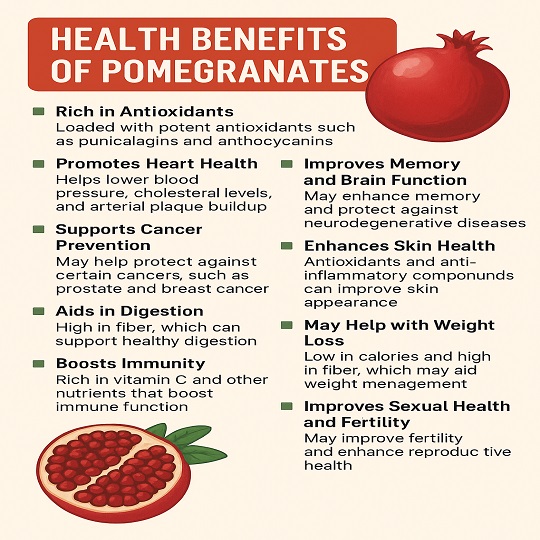
Pomegranate Juice Benefits: Why This Ruby-Red Drink Is a Natural Health Booster
Pomegranate juice benefits. Known for its vibrant color and rich, sweet-tart flavor, is more than just a refreshing drink. It’s a powerful natural elixir packed with nutrients, antioxidants, and medicinal properties. Used for centuries in traditional medicine, modern science now supports many of its health benefits.
In this article, we’ll explore the top pomegranate juice benefits, its nutritional value, and how incorporating it into your diet can support your overall health and well-being.
1. Packed with Powerful Antioxidants
Pomegranate juice is a rich source of antioxidants, which help neutralize harmful free radicals in the body. The primary antioxidants found in pomegranate juice are punicalagins, anthocyanins, and ellagic acid — all of which have potent anti-inflammatory and anti-aging effects.
Compared to green tea and red wine, pomegranate juice contains three times more antioxidants, making it one of the most powerful natural drinks for protecting your body at the cellular level.
2. Supports Heart Health
One of the most studied benefits of pomegranate juice is its ability to promote a healthy heart.
Key heart benefits:
- Lowers blood pressure: Pomegranate juice may help reduce systolic blood pressure by relaxing blood vessels.
- Reduces LDL cholesterol: It helps reduce “bad” cholesterol levels and prevent oxidation, a key contributor to plaque buildup.
- Improves circulation: It may enhance blood flow and reduce the risk of arterial stiffness, reducing the risk of heart attacks and strokes.
A daily glass of pomegranate juice can be a natural way to support cardiovascular health.
3. Fights Inflammation
Chronic inflammation is linked to many serious illnesses, including cancer, diabetes, and Alzheimer’s disease. Pomegranate juice contains compounds with strong anti-inflammatory properties, especially punicalagins, which can help lower inflammation markers throughout the body.
This makes it beneficial for people dealing with autoimmune diseases, arthritis, or other inflammatory conditions.
4. May Reduce the Risk of Certain Cancers
Emerging research suggests that pomegranate juice may play a role in cancer prevention, particularly in prostate and breast cancers.
- In men, pomegranate juice has been shown to slow the growth of prostate cancer cells and reduce PSA (prostate-specific antigen) levels.
- In women, studies show it can inhibit breast cancer cell growth and promote cancer cell death.
While more human trials are needed, early evidence is promising and suggests pomegranate juice may support cancer-fighting efforts naturally.
5. Boosts Brain Health and Memory
Pomegranate juice contains polyphenols that support cognitive function. It may protect the brain from damage caused by oxidative stress and inflammation.
Research highlights:
A clinical study found that older adults who drank 8 ounces of pomegranate juice daily for four weeks showed improvements in verbal and visual memory. Regular consumption may also reduce the risk of Alzheimer’s disease and age-related mental decline.
6. Strengthens the Immune System
Thanks to its high vitamin C content, pomegranate juice helps strengthen your immune defenses. It also contains vitamin E and other immune-boosting nutrients that help the body fight infections, viruses, and inflammation.
During cold and flu seasons, a daily dose of pomegranate juice can offer extra protection and speed up recovery.
7. Aids Digestion and Gut Health
Pomegranate juice has anti-inflammatory and antibacterial properties that can help maintain a healthy digestive system.
It promotes the growth of good gut bacteria, which supports digestion and nutrient absorption. Pomegranate juice may also help ease symptoms of inflammatory bowel diseases like Crohn’s and ulcerative colitis.
8. Promotes Healthy Skin
Antioxidants in pomegranate juice don’t just benefit internal health — they also enhance your skin.
- Fights acne and inflammation
- Improves skin hydration
- Slows signs of aging
Drinking pomegranate juice regularly may lead to clearer, more radiant skin by promoting collagen production and reducing oxidative damage.
9. Helps with Weight Management
Pomegranate juice is relatively low in calories but rich in fiber (when consumed with some pulp). It helps increase satiety, reducing cravings and supporting healthy weight loss efforts.
Although it’s not a magic weight loss drink, it can be a valuable addition to a balanced, calorie-conscious diet.
10. Natural Aphrodisiac and Fertility Booster
Traditionally seen as a symbol of fertility, pomegranate juice has been linked with enhanced sexual health.
- In men, it may improve testosterone levels and sperm quality.
- In women, it may support hormone balance and uterine health.
Its nitric oxide-boosting properties also promote better blood flow, contributing to enhanced libido and sexual function.
Nutritional Facts (Per 1 Cup – 8 oz)
| Nutrient | Amount |
|---|---|
| Calories | 134 |
| Vitamin C | 30% DV |
| Potassium | 533 mg |
| Folate | 15% DV |
| Polyphenols | High |
| Sugar (natural) | ~30g |
Pomegranate Juice Benefits
How to Choose the Best Pomegranate Juice
To enjoy the full benefits, choose:
- 100% pure pomegranate juice
- No added sugars or preservatives
- Cold-pressed juice, if available
Avoid juice blends or pomegranate-flavored drinks that may contain little to no actual pomegranate.
Conclusion
Pomegranate juice is more than just a tasty beverage — it’s a nutrient-rich superdrink with extensive health benefits. From reducing inflammation and supporting heart health to enhancing brain function and glowing skin, pomegranate juice deserves a spot in your daily diet.
Enjoy a glass a day to naturally boost your health and vitality.
References
- Aviram, M., & Dornfeld, L. (2001). Pomegranate juice consumption reduces oxidative stress, atherogenic modifications to LDL, and platelet aggregation: Studies in humans and in atherosclerotic apolipoprotein E-deficient mice. The American Journal of Clinical Nutrition, 71(5), 1062–1076. https://doi.org/10.1093/ajcn/71.5.1062
- Basu, A., & Penugonda, K. (2009). Pomegranate juice: A heart-healthy fruit juice. Nutrition Reviews, 67(1), 49–56. https://doi.org/10.1111/j.1753-4887.2008.00133.x
- Jurenka, J. S. (2008). Therapeutic applications of pomegranate (Punica granatum L.): A review. Alternative Medicine Review, 13(2), 128–144. https://pubmed.ncbi.nlm.nih.gov/18590349/
- Seeram, N. P., Adams, L. S., Henning, S. M., Niu, Y., Zhang, Y., Nair, M. G., & Heber, D. (2005). In vitro antiproliferative, apoptotic and antioxidant activities of punicalagin, ellagic acid and a total pomegranate tannin extract are enhanced in combination with other polyphenols. Journal of Nutritional Biochemistry, 16(6), 360–367. https://doi.org/10.1016/j.jnutbio.2005.01.006
- Heber, D. (2008). Multitargeted therapy of cancer by ellagitannins. Cancer Letters, 269(2), 262–268. https://doi.org/10.1016/j.canlet.2008.03.053
- United States Department of Agriculture. (n.d.). FoodData Central – Pomegranate juice, 100%. https://fdc.nal.usda.gov/fdc-app.html#/food-details/1102695/nutrients
- Alzheimer’s Association. (n.d.). The impact of nutrition and antioxidants on Alzheimer’s and cognitive decline. https://www.alz.org/help-support/brain_health/healthy_diet
- Harvard T.H. Chan School of Public Health. (n.d.). Pomegranates. https://www.hsph.harvard.edu/nutritionsource/food-features/pomegranates/
- Shukla, M., Gupta, K., Rasheed, Z., Khan, K. A., & Haqqi, T. M. (2008). Consumption of hydrolyzable tannins-rich pomegranate extract suppresses inflammation and joint damage in rheumatoid arthritis. Nutrition, 24(7–8), 733–743. https://doi.org/10.1016/j.nut.2008.03.012
- Gil, M. I., Tomás-Barberán, F. A., Hess-Pierce, B., Holcroft, D. M., & Kader, A. A. (2000). Antioxidant activity of pomegranate juice and its relationship with phenolic composition and processing. Journal of Agricultural and Food Chemistry, 48(10), 4581–4589. https://doi.org/10.1021/jf000404a




